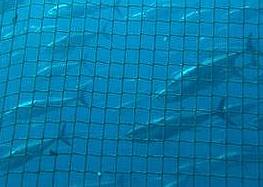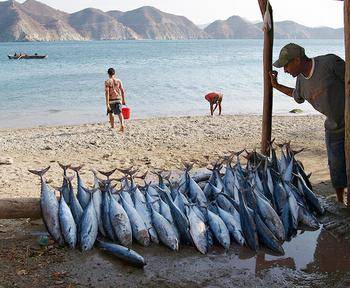 各國政府意識到鮪魚過度捕撈造成全球魚群存量嚴重減少帶來的損害,有鑒于此,大西洋和太平洋沿岸各國,于上週共同加入支持保育的行列,以因應日益減少的鮪魚存量。
各國政府意識到鮪魚過度捕撈造成全球魚群存量嚴重減少帶來的損害,有鑒于此,大西洋和太平洋沿岸各國,于上週共同加入支持保育的行列,以因應日益減少的鮪魚存量。
針對法國未來可持續漁業和海洋政策所召開的國家利益相關者協商會議,在閉幕致辭中,總統薩科齊表示,「法國支持將黑鮪魚列入(華盛頓公約)瀕絕野生動植物國際貿易公約(CITES)清單,嚴禁黑鮪魚在國際市場上販售。」
摩納哥公國是第一個表態聲援此項提案的國家。同時也在同一週正式啟動了CITES協商進程,以尋求其他產地國的支持。
北方黑鮪魚的活動範圍在北大西洋和地中海一帶。該物種目前面臨瀕危的困境。
 導致該物種數量急劇下滑的原因包括了漁船船隊超捕、漁獲量遠超過法定限額、盜捕、非法使用偵察機圍攏群、漁獲量低報、禁捕季節期間進行捕撈、缺乏科學根據的管理措施等等。而奢華海鮮市場為供應全球貪得無厭的胃口,正是驅動這些行爲背後的推手。這也就是北方黑鮪魚價格屢創新高的原因。
導致該物種數量急劇下滑的原因包括了漁船船隊超捕、漁獲量遠超過法定限額、盜捕、非法使用偵察機圍攏群、漁獲量低報、禁捕季節期間進行捕撈、缺乏科學根據的管理措施等等。而奢華海鮮市場為供應全球貪得無厭的胃口,正是驅動這些行爲背後的推手。這也就是北方黑鮪魚價格屢創新高的原因。
反觀地球的另一邊,隨著哥倫比亞政府響應每年禁止捕撈鮪魚二個月的決定,東太平洋未來的鮪魚存量因此有了復育的希望。
經協商,各國同意2009年在東太平洋禁捕鮪魚的時間為59天,2010年為62天,2011年為73天。6月份召開的泛美熱帶鮪魚協會(IATTC)會議上,哥倫比亞成爲16個締約國中贊同採取此項提案的最後一個國家。該團體分別由10個拉丁美洲國家、美國、日本、西班牙、韓國、法國、萬那杜等國所組成。
根據IATTC的研究顯示,鮪魚在東太平洋的數量迅速下滑,特別是大眼鮪。此外,聯合國糧農組織(United Nations Food and Agriculture Organization)的數據也指出,在大西洋和太平洋的黃鮪魚遭到「大量過度捕撈,」也就是說,黃鮪魚存量嚴重枯竭。
哥倫比亞與國際保育聯盟Conservation International-Colombia的阿爾霍納(Fabio Arjona)表示:「我們現在需要敦促中西太平洋漁業委員會(Western and Central Pacific Fisheries Commission),對該地區的鮪魚存量進行保育措施,尤其是遷徙經過太平洋,屬於共有的鮪魚群。」
Declining populations of tunas received conservation support from countries bordering the Atlantic Ocean and the Pacific Ocean this week as governments realize how much damage overfishing has done to the world's tuna stocks.
Speaking at the close of a national stakeholder consultation on France's future sustainable fisheries and maritime policy, the "Grenelle de la Mer," President Nicolas Sarkozy said, "France supports listing bluefin tuna on the CITES convention to ban international trade."
The Principality of Monaco was first to communicate its willingness to sponsor a proposal to ban international trade in Atlantic bluefin tuna, and has this week launched a formal CITES consultation process to seek the support of other range States.
Northern Bluefin Tuna is found in the North Atlantic and Mediterranean and the species is in trouble.
Contributing to the species' steep decline are the huge overcapacity of fishing fleets, catches that far exceed legal quotas, pirate fishing, the use of illegal spotting planes to chase tuna, under-reporting of catch, fishing during the closed season, management measures that disregard scientific advice - all driven by the insatiable appetite of the world's luxury seafood markets where Northern Bluefin Tuna fetches record prices.
On the other side of the world, hope for the future of the tuna stocks in the Eastern Pacific was raised when the Colombian government agreed to support an annual two month ban on tuna fishing.
Tuna fishing in the Eastern Pacific will be banned for 59 days in 2009, 62 days in 2010 and 73 days in 2011.
Colombia was the last of the 16 nations that make up the IATTC to endorse the measures proposed at the meeting of the Commission in June. The group is made up of 10 Latin American nations and the United States, Japan, Spain, South Korea, France and Vanuatu.
Studies carried out by the IATTC showed a rapid deterioration of tuna populations in the Eastern Pacific Ocean - particularly bigeye - and data from the United Nations Food and Agriculture Organization states that yellowfin tuna has been "fully exploited" in the Atlantic and the Pacific Oceans, meaning that stocks are seriously depleted.
"We now need to urge the Western and Central Pacific Fisheries Commission to adopt conservation measures for the tuna stocks in that region," Fabio Arjona from Conservation International-Colombia said, "and in particular, the shared stocks of migratory tuna in the Pacific Ocean."





